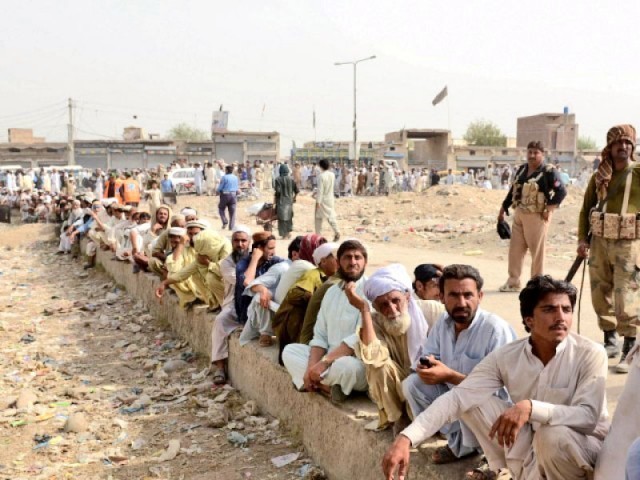
Following military operations against militants in North Waziristan Agency, at least 85,000 families fled to Bannu district; 2,654 families in settlements in just Bannu tehsil alone. The district’s economy, essential services, infrastructure as well as meagre resources were overburdened.
Domestic violence: ‘Drunkard’ father beaten to death
However, those were not the only adverse impacts reported – surveys conducted by a group of organisations, including EHSAR Foundation, Sarhad Rural Support Program (SRSP), Camp Coordination and Camp Management, and Protection Cluster Pakistan revealed alarming data regarding early marriages, sexual and domestic violence against girls and boys, lack of health facilities and problems of education and shelter. The data was collected in January and February 2016.
According to the survey report titled Profiling of IDPs living in spontaneous settlements in Bannu, at least 12,354 individuals, representing 2,654 families, were interviewed. In addition to data collected from respondents using a questionnaire, a desk reviewed all reports.

Brutal numbers
The survey report, a copy of which is available with The Express Tribune, was filed following a questionnaire filled by displaced people living in camps. According to it, 21% people reported early marriages as a “major issue of concern”. At least 15% people reported violence against girls and boys and some 6% confirmed reported gender-based violence “including sexual and domestic assaults against women, men and children”.
Spreading terror: BDU neutralises five bombs planted on electricity pylon in city
According to those who were collecting the data, “negative behaviour towards women was on the rise, which increased the risk of domestic violence.” They also noticed children were in need of counselling and women seemed prone to depression. “Anxiety is commonly observed in the behaviour of all IDPs.”
Health concerns
According to the survey report, 62% of the population said there were no basic health units in the settlements or their vicinity.
Even though majority of people living in these settlements were women and children, women were reported to have minimal access to health services. The nearest health facility was situated 10 kilometres away and lacked lady health workers and traditional birth attendants. This meant given the cultural sensitivity of the region and its people, women faced tremendous problems in cases of pregnancies and other health problems.
The data stated 71% of the population living in temporary settlements had to visit district and tehsil headquarter hospitals. Around 21% could access a basic health unit.
“Major diseases prevailing in camps include diarrhoea (21%), measles (5%), malaria (19%), skin diseases (17%) and cough and flu (34%),” the report read. Safe drinking water was not available for 71% of the people in the camps.

DATA TAKEN FROM THE SURVEY
At least 70% of displaced families fetched drinking water from hand pumps, 8% depended on river and streams while 21% collected it from a well. According to the report, 71% of the families said daily amounts of safe drinking water was insufficient. Some 9% pointed out water tanks or wells as a gap in needed amenities.
There were no proper toilets available in the settlement. The document states people have put up tent toilets using fabric.
Food security
Regarding sufficiency of food, 67% inhabitants of these settlements in Bannu were satisfied while 32% stated otherwise. The latter said unregistered families were living with their extended families in the camps which meant food supply was inadequate.
PDA requests security for hospitals, doctors hostels
At least 63% of the IDPs surveyed did not have money to buy food from the market.
When asked whether there were any reports or indications that women stopped or reduced breastfeeding, 74% of people denied the claim. Of the 8% who said yes, 42% said it was due to insufficient food.
Looking for privacy
There was no privacy in the settlements – 61% of displaced people lived in transitional shelter, 16% in tents while 5% resided in other makeshift arrangements.
Some 2% asked for partitions within shelters and some 4% for individual shelters.
Around 55% IDPs said they received winterised non-food items (NFI) kit while 45% had not as a majority of them lacked registration documentations. Survey data revealed 73% of families living in the settlements had at least one family member without a computerised national identity card.
While some families showed kindness and hosted displaced families, most have become hesitant following searches against non-state actors in rented houses.
Suggestions for future
At the end of the questionnaire, a list of facilities was provided which respondents could tick to identify gaps in services available. Around 8% pointed out toilets for women, 9% bathing areas for women, 8% firewood for fuel and some 8% health facilities.
The organisations that conducted the surveys recommended cash for work interventions; provision of clean drinking water and construction of latrines; mobile health clinics with health care for pregnant and lactating women; and increased coordination with the education department for provision of school tents in the camps.
Published in The Express Tribune, April 5th, 2016.











COMMENTS (1)
Comments are moderated and generally will be posted if they are on-topic and not abusive.
For more information, please see our Comments FAQ